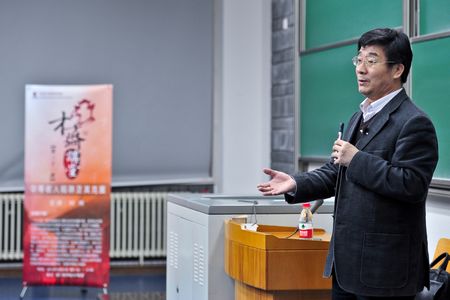Peking University, Mar. 6, 2012: According to the Daily Telegraph, China’s spectacular catch-up growth is nearing its limits, leaving the country prey to the "middle-income trap" over coming years unless Beijing embraces the free market and relaxes its suffocating grip over the economy. So what is the middle income trap? How to avoid the middle income trap? At 7:00 PM on the evening of Feb 23, Professor Liu Wei, vice president of PKU and professor of the School of Economics, gave a speech on the above matters.

Professor Liu Wei at his lecture
First of all, Professor Liu introduced when and why the concept of "middle income trap " came into being. "Middle income trap" was a new concept which was first proposed in the report of the World Bank of 2006."Many countries make it from low income to middle income, but very few actually make that second leap to high-income," said Ardo Hansson, a World Bank economist in Beijing. “They seem to get stuck in a trap where your costs are escalating and you lose competitiveness.”
For decades, many countries in Latin America and the Middle East have failed in this task. South Korea, though, after nearly defaulting on its debts at the end of 1997, pulled itself together and resumed its march up the value chain. Hong Kong and Taiwan had also managed to survive their middle income trap. By quoting many cases in reality, Professor Liu Wei made the complex concept easy to understand in a very humorous way. Through comparison of the economic and social characteristics of the two types of countries and regions--those who had overcome the middle income trap and those who hadn't, Professior Liu Wei summarized three reasons of the failure ones, including insufficient domestic demand, sluggish transformation of the development pattern and backward social system innovation.
He mentioned that now China seems to be troubled in the middle income trap. Seen from the structural index like the employment rate of the agricultural workforce, the urbanization rate and the Engel's coefficient, China remains to be a developing country with a middle level income. But it is faced with the threat of the middle income trap.
Professor Liu Wei also analyzed the key measures that China needs to take to avoid the trap. He believed that China has to embark on far-reaching market changes and emphasize the efficiency of investment. It must foster innovation and make it easier for more productive private companies to enter sectors like finance and logistics. He thought that to avoid the middle income trap, what really mattered was the investment in human capital and the improvement of the market quality and market order.
Written by: Dong Zhiyao
Edited by: Cao Yixing
Source: PKU News (Chinese)